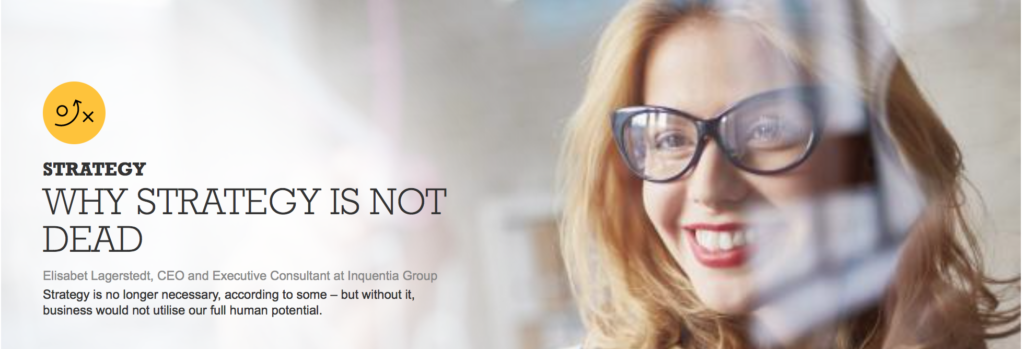Why Strategy Is Not Dead

Strategy is no longer necessary, according to some – but without it, business would not utilise our full human potential. This article was first published on INSEAD Knowledge.
A few years back, a searing pain in my elbow sent me to the doctor, who diagnosed me with Olecranon Bursitis. Apparently, all that time spent leaning forward on hard desks in different meeting rooms during my team’s frequent marathon strategic planning sessions was putting too much stress on my poor elbow. The doctor told me I would either have to shorten these sessions in future, or find a better way of developing strategy.
However, a growing movement in business thinking would have me drop the painstaking process of strategic planning altogether. It’s just not thought to be fast and agile enough to fit into an environment of rapid change. And quite honestly, I can understand that.
With research showing that not even half of all strategic plans successfully reach their goals, and a world changing at a higher speed than ever before, it may actually seem futile and naïve to invest time into strategy development.
Meantime, there are counter-detractors who insist strategy is still essential, but companies are doing it wrong—either by overlooking execution or using outmoded planning methods, or both.
But this debate often neglects what is, in my opinion, the best argument for strategy’s continued relevance: Strategic approaches to business—and life—just make deep-down sense to human beings.
Three ways strategic planning serves our humanity
As humans we share common strengths and weaknesses, and have come to operate effectively under certain circumstances, which I believe also influence the way we do business. Let’s take a brief look at each of them, one at a time.
- Focus is the key to success
We can’t do everything, not as individuals and not as teams, or businesses. As humans, we have a limited span of attention and need to prioritise and focus on what matters most to get things done. And, for businesses, ideally focus on what matters most to their customers. Focus is actually the key to any human success, or the hidden driver of excellence, according to Daniel Goleman. In a more complex world full of distractions, focus is actually more relevant than ever. Here, the tools and frameworks of strategy can help us focus by forcing us to consciously choose our playing field as well as our direction. Or as Richard P. Rumelt puts it in Good Strategy/Bad Strategy, “Good strategy works by focusing energy and resources on one, or a very few, pivotal objectives whose accomplishment will lead to a cascade of favourable outcomes.”
- Thinking ahead is a human capability
The ability to think ahead is a human trait that has followed us through our history and helped us become a successful species. Planning and positioning us well for the future means making a series of conscious decisions now, and taking a step back and looking at the larger picture rather than being totally preoccupied with ongoing day-to-day events. Today, we are as a species actually forming the planet. Anthropologists even suggest that we live in the human age, or the Anthropocene, with the human race simply being the dominant force of change on the planet. This implies that we have a responsibility to shape the future consciously, instead of feeling and acting like helpless victims of an unpredictable environment outside our control. We always have a choice. Here, I am convinced that good strategy can help individuals, teams, businesses and governments to wisely and consciously co-create a future we would actually want to live in.
- Learning is an important part of (business) life
We all know intuitively that we learn by experience. However, research tells us that without the process of actively thinking about those experiences, and reflecting on what happened and what they mean, learning doesn’t happen. As businesspeople we have very busy schedules and are normally caught up in the actions of day-to-day business. Thinking and reflection takes time—time that we often don’t have, or allow ourselves to take. Yet take it we must. Strategy development especially, but also strategy implementation and follow up, has the potential to help schedule thinking and reflection into your business life to make sure that you utilise your whole portfolio of human capabilities. It simply forces you to take time out to of day-to-day operations to reflect on your organisation’s environment, core competencies, purpose, direction and future, together with your team.
Bring out your inner strategist
Of course, it’s not possible for us to foresee the future, but we can prepare to assume an active role in it. I have earlier written about how businesses should keep track of evolving global mega-trends, e.g. the digital society, aging population, sustainability and urbanisation. And the tools and frameworks of strategy can actually help you make connections between the future of our world and the future of your company.
An important step into that future could be to bring out your inner strategist, as suggested by Cynthia Montgomery in The Strategist. Because, as a successful strategist you will constantly be asking yourself:
- What does my company bring the world?
- Does that difference matter?
- Are we relevant?
- How do we add value?
- How will we be relevant and add value in the future?
In case you were wondering what happened to my elbow, it actually recovered rather quickly. And the strategy we worked on took us very close to our intended destination. Just in ways we could not have completely imagined.
For more on what strategy is and why you should be doing it, check out my latest Slideshare presentation.
Elisabet Lagerstedt is Founder, CEO, and Executive Consultant at Inquentia Group. You can contact Elisabet at elisabet.lagerstedt@inquentia.com or follow her on Twitter at @ElisabetLagerst
Follow INSEAD Knowledge on Twitter and Facebook